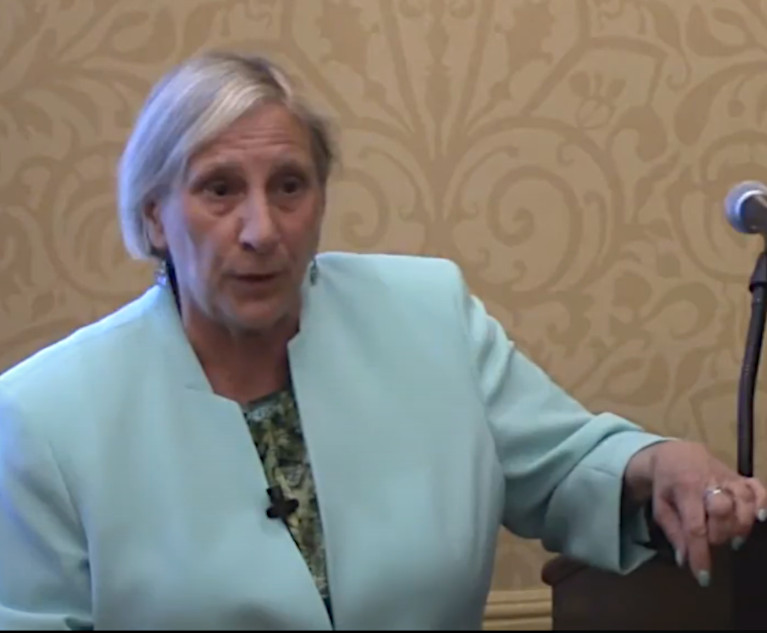Wells Fargo Agrees to Pay NY $65M for Misleading Investors on Fake Accounts, AG Says
The penalty is part of an investigation by the state into the bank's business practices, which came under scrutiny in 2016 when federal regulators revealed employees had created more than 2 million fake accounts to meet sales targets.
October 22, 2018 at 03:57 PM
4 minute read
The original version of this story was published on New York Law Journal
 Wells Fargo New York headquarters at 150 E 42nd St. Photo: John Taggart/Bloomberg
Wells Fargo New York headquarters at 150 E 42nd St. Photo: John Taggart/Bloomberg
Wells Fargo will pay New York state $65 million after producing fraudulent statements to investors about its “cross-sell” business model, which led the bank's employees to open millions of fake accounts without customers' knowledge, Attorney General Barbara Underwood said Monday.
The penalty is part of an investigation by the state into the bank's business practices, which came under scrutiny in 2016 when federal regulators revealed employees had created more than 2 million fake accounts to meet sales targets.
Underwood's office said Monday's announcement will have no impact on its ongoing investigation into Wells Fargo over the fake accounts or other pending investigations. Underwood said in a statement that investors were misled by the bank.
“The misconduct at Wells Fargo was widespread across the bank and at every level of management—impacting both customers and investors who were misled,” Underwood said. “State securities laws are vital to protecting the hard-earned savings of working families and Main Street investors from financial fraud, and my office will continue to do what's necessary to protect the public and the integrity of our markets.”
Wells Fargo said in a statement that it did not admit liability in agreeing to the penalty, but that it is another step forward in rebuilding public trust.
“Wells Fargo did not admit liability, and we believe that putting this matter behind us is in the best interest of all of our stakeholders, including customers. The settlement costs have been previously accrued,” the bank said. “We are making strong progress in our work to rebuild trust, and this represents another step forward.”
According to Underwood's office, Wells Fargo told investors that it would be able to increase revenues and better serve customers by “cross-selling.” The practice refers to selling new financial products or services to an already existing customer. The bank regularly reported cross-selling metrics to investors that supposedly showed success in the practice, according to Underwood's office.
The bank did not, however, tell investors that the success of its cross-selling strategy came from fraudulent sales practices, driven by unrealistic sales goals, Underwood's office said. Employees who met the targets were apparently eligible for promotions and bonuses while those who did not were pressured to do more and, in some cases, fired.
Former Wells Fargo CEO John Stumpf told Congress that he became aware of the misconduct as early as 2013. Investors in New York lost millions of dollars when the bank announced the fraudulent practices in 2016, Underwood's office said.
The $65 million penalty is on top of a $142 million class action settlement for customer remediation and settlement expenses Wells Fargo entered into over the fraudulent accounts last year. The bank was separately fined $1 billion by federal regulators last year for signing up and charging customers for car insurance they didn't need and imposing unfair fees on mortgage borrowers.
The company said on its website that it has taken several steps since 2016 to reform how it does business. It no longer tracks metrics on cross-selling and does not base employee performance on the practice. It has also pledged to improve risk management, oversight of its business practices, and compliance with state and federal regulations.
Senior Enforcement Counsel Hannah Flamenbaum and Assistant Attorneys General Melissa Gable and Amita Singh of Underwood's Investor Protection Bureau handled the agreement announced Monday. The office is uniquely positioned to handle such disputes under the Martin Act, which allows the state attorney general to investigate cases of suspected securities fraud.
READ MORE:
Documents: Feds Hit Wells Fargo for $1B Penalty for Consumer Abuses
Wells Fargo Turned to Sullivan & Cromwell Ahead of $1B Consumer Settlement
NY Court of Appeals Dismisses AG's Martin Act Claims Against Credit Suisse
This content has been archived. It is available through our partners, LexisNexis® and Bloomberg Law.
To view this content, please continue to their sites.
Not a Lexis Subscriber?
Subscribe Now
Not a Bloomberg Law Subscriber?
Subscribe Now
NOT FOR REPRINT
© 2025 ALM Global, LLC, All Rights Reserved. Request academic re-use from www.copyright.com. All other uses, submit a request to [email protected]. For more information visit Asset & Logo Licensing.
You Might Like
View All
A Plan Is Brewing to Limit Big-Dollar Suits in Georgia—and Lawyers Have Mixed Feelings
10 minute read
HUD Charges Texas HOA With Housing Discrimination in Last Days of Biden Administration
5 minute read
Trending Stories
- 1Midlevel Appellate Court Reinstates New York's Voting Rights Act
- 2Consumer Protection Suit Cleared to Go Forward Against Irritating Eye Serum
- 3COVID-19 Was Still Relevant in Securities Class Actions During 2024, Report Says
- 4After Botched Landing of United Airlines Boeing 767, Unlikely Plaintiff Sues Carrier
- 5DOT Moves to Roll Back Emissions Rules, Eliminate DEI Programs
Who Got The Work
J. Brugh Lower of Gibbons has entered an appearance for industrial equipment supplier Devco Corporation in a pending trademark infringement lawsuit. The suit, accusing the defendant of selling knock-off Graco products, was filed Dec. 18 in New Jersey District Court by Rivkin Radler on behalf of Graco Inc. and Graco Minnesota. The case, assigned to U.S. District Judge Zahid N. Quraishi, is 3:24-cv-11294, Graco Inc. et al v. Devco Corporation.
Who Got The Work
Rebecca Maller-Stein and Kent A. Yalowitz of Arnold & Porter Kaye Scholer have entered their appearances for Hanaco Venture Capital and its executives, Lior Prosor and David Frankel, in a pending securities lawsuit. The action, filed on Dec. 24 in New York Southern District Court by Zell, Aron & Co. on behalf of Goldeneye Advisors, accuses the defendants of negligently and fraudulently managing the plaintiff's $1 million investment. The case, assigned to U.S. District Judge Vernon S. Broderick, is 1:24-cv-09918, Goldeneye Advisors, LLC v. Hanaco Venture Capital, Ltd. et al.
Who Got The Work
Attorneys from A&O Shearman has stepped in as defense counsel for Toronto-Dominion Bank and other defendants in a pending securities class action. The suit, filed Dec. 11 in New York Southern District Court by Bleichmar Fonti & Auld, accuses the defendants of concealing the bank's 'pervasive' deficiencies in regards to its compliance with the Bank Secrecy Act and the quality of its anti-money laundering controls. The case, assigned to U.S. District Judge Arun Subramanian, is 1:24-cv-09445, Gonzalez v. The Toronto-Dominion Bank et al.
Who Got The Work
Crown Castle International, a Pennsylvania company providing shared communications infrastructure, has turned to Luke D. Wolf of Gordon Rees Scully Mansukhani to fend off a pending breach-of-contract lawsuit. The court action, filed Nov. 25 in Michigan Eastern District Court by Hooper Hathaway PC on behalf of The Town Residences LLC, accuses Crown Castle of failing to transfer approximately $30,000 in utility payments from T-Mobile in breach of a roof-top lease and assignment agreement. The case, assigned to U.S. District Judge Susan K. Declercq, is 2:24-cv-13131, The Town Residences LLC v. T-Mobile US, Inc. et al.
Who Got The Work
Wilfred P. Coronato and Daniel M. Schwartz of McCarter & English have stepped in as defense counsel to Electrolux Home Products Inc. in a pending product liability lawsuit. The court action, filed Nov. 26 in New York Eastern District Court by Poulos Lopiccolo PC and Nagel Rice LLP on behalf of David Stern, alleges that the defendant's refrigerators’ drawers and shelving repeatedly break and fall apart within months after purchase. The case, assigned to U.S. District Judge Joan M. Azrack, is 2:24-cv-08204, Stern v. Electrolux Home Products, Inc.
Featured Firms
Law Offices of Gary Martin Hays & Associates, P.C.
(470) 294-1674
Law Offices of Mark E. Salomone
(857) 444-6468
Smith & Hassler
(713) 739-1250









